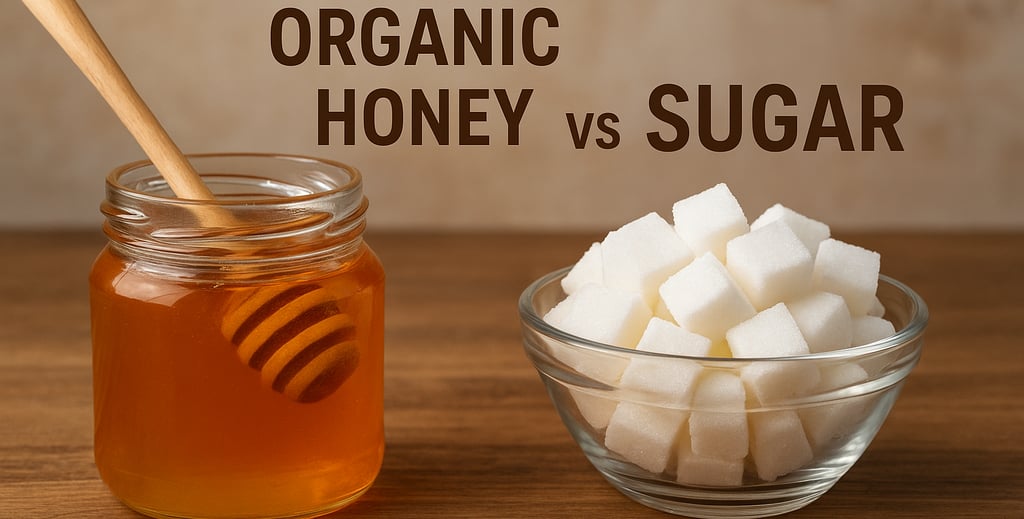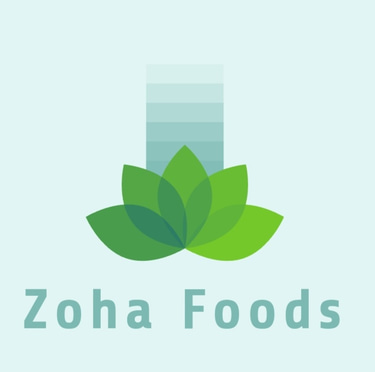Organic Honey vs Sugar – Which Is the Better Sweetener? (2025 Guide)
Discover the differences between organic honey vs sugar. Learn which sweetener is healthier, their nutritional benefits, long-term health effects, and why honey is the better choice in 2025.
HONEY
Zia Khan
9/9/20254 min read


The debate of organic honey vs sugar – which is the better sweetener has gained even more attention in 2025 as more people shift toward healthier diets. While sugar remains the most common sweetener worldwide, organic honey has become increasingly popular among health-conscious consumers seeking a natural alternative.
But which one truly deserves a spot in your daily diet? Is organic honey really healthier than sugar, or is it just a more expensive sweetener with good marketing? In this guide, we’ll break down the science, nutrition, health impacts, and long-term benefits of both to help you make an informed choice.
Understanding Organic Honey
Organic honey is honey produced under strict organic farming practices. This means:
Bees are kept in areas free of pesticides and herbicides.
No antibiotics or chemicals are used in the hives.
Honey is processed minimally without additives.
Nutritional Profile of Organic Honey (per tablespoon):
Calories: ~64
Carbohydrates: ~17g
Natural sugars: fructose & glucose
Trace vitamins: B vitamins, vitamin C
Minerals: potassium, magnesium, iron, zinc
Antioxidants & enzymes
Unlike regular honey, organic honey guarantees purity, making it a healthier choice for those avoiding synthetic chemicals.
Understanding Refined Sugar
Refined sugar is derived from sugarcane or sugar beets and goes through a heavy industrial process to strip away molasses, vitamins, and minerals.
Nutritional Profile of Refined Sugar (per tablespoon):
Calories: ~49
Carbohydrates: ~12.6g
Pure sucrose (no vitamins, minerals, or antioxidants)
Sugar provides quick energy but is considered empty calories, meaning it has no nutritional value beyond energy.
Common Types of Refined Sugar:
White sugar – most common, highly processed.
Brown sugar – contains small traces of molasses.
Powdered sugar – ground white sugar with cornstarch.
Nutritional Comparison – Honey vs Sugar
Calories
Honey: ~64 calories per tablespoon
Sugar: ~49 calories per tablespoon
👉 Honey is slightly higher in calories, but more concentrated in nutrients.
Natural Nutrients
Honey: contains enzymes, amino acids, antioxidants, vitamins, and minerals.
Sugar: offers no nutrients beyond sucrose.
Glycemic Index (GI)
Honey GI: 45–55 (varies by type, organic honey is lower)
Sugar GI: ~65
👉 Honey causes a slower rise in blood sugar, making it a better choice for energy balance.
Health Benefits of Organic Honey
Unlike sugar, honey has been valued for centuries not just as a sweetener, but as medicine.
Antibacterial & Healing Properties
Organic honey, especially raw varieties, has natural antibacterial compounds. It’s used in wound healing, skin treatments, and oral care.
Immune System Support
Honey strengthens immunity thanks to its antioxidants and trace minerals.
Digestive Health
Honey may help with acid reflux, ulcers, and gut microbiome balance, unlike sugar which disrupts gut bacteria.
Energy & Athletic Performance
Athletes often use honey as a natural energy booster because it provides quick yet sustained energy release.
Health Risks of Refined Sugar
Refined sugar, especially when consumed excessively, is linked to serious health risks:
Blood Sugar Spikes → leads to crashes, fatigue, irritability.
Weight Gain → sugar triggers insulin resistance and fat storage.
Type 2 Diabetes → excessive sugar intake increases risk.
Tooth Decay → fuels bacteria that cause cavities.
Chronic Inflammation → contributes to heart disease, fatty liver, and even some cancers.
In 2025, the World Health Organization (WHO) still advises limiting added sugar intake to less than 10% of daily calories.
Weight Management – Honey vs Sugar
When it comes to weight management, neither should be consumed in excess, but honey has a slight advantage.
Honey: Its lower GI means it provides longer-lasting energy and less appetite stimulation. Some studies suggest honey may help regulate metabolism.
Sugar: Causes insulin spikes, hunger cravings, and fat storage, making it a bigger risk for obesity.
👉 If you are trying to lose or manage weight, replacing sugar with small amounts of honey is a healthier option.
Cooking and Baking with Honey vs Sugar
Flavor Differences
Honey: Rich, floral, and slightly acidic flavor.
Sugar: Neutral, pure sweetness.
Substitution Guide
Replace 1 cup of sugar with ¾ cup of honey.
Reduce liquid in the recipe (honey adds moisture).
Lower baking temperature slightly (honey caramelizes faster).
Shelf Life & Storage
Honey: Does not spoil if stored properly.
Sugar: Has indefinite shelf life but no added health benefits.
Cost & Accessibility
Organic Honey: More expensive due to natural beekeeping, organic certification, and limited supply. A 500g jar can cost 5–10x more than sugar.
Refined Sugar: Cheapest sweetener, mass-produced, widely available in every market.
👉 If budget is a concern, sugar is more accessible, but honey offers better long-term health value.
Long-Term Health Effects
Sugar
Decades of studies link high sugar intake to obesity, diabetes, cardiovascular disease, and early aging.
Honey
Research shows honey can reduce oxidative stress, support gut health, and strengthen immunity. While still a sugar, its added nutrients make it a better long-term choice when used in moderation.
When to Choose Honey and When to Avoid It
Best Times to Choose Honey
For natural energy (pre-workout, post-workout).
When fighting colds or sore throats.
As part of a holistic organic diet.
When to Avoid Honey
Infants under 1 year old (risk of botulism).
Individuals with severe bee pollen allergies.
Those on strict low-carb or keto diets.
Final Verdict – Which Is the Better Sweetener?
So, organic honey vs sugar – which is the better sweetener?
The answer is clear: Organic honey is the healthier choice. While both provide sweetness and calories, honey offers additional nutrients, antioxidants, and health benefits that sugar simply cannot match.
That said, moderation is key. Even honey is still a sugar, and excessive consumption can contribute to weight gain. But if you’re choosing between the two, organic honey is worth the extra cost for your long-term health.
👉 For more details on honey’s health potential, check our blog: Organic Honey Benefits – Complete 2025 Guide.
Conclusion
Refined sugar may be cheap and convenient, but its health risks outweigh the benefits. Organic honey, while more expensive, provides nutritional value, medicinal benefits, and lower long-term health risks.
In 2025, with growing health awareness, the choice is simple: swap refined sugar for organic honey whenever possible. Your body will thank you.
